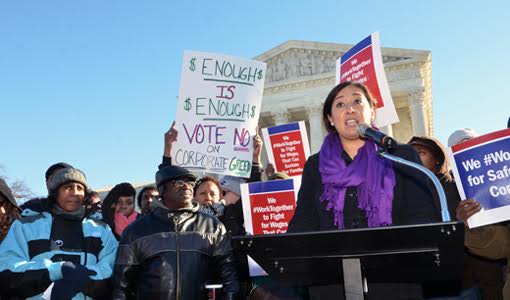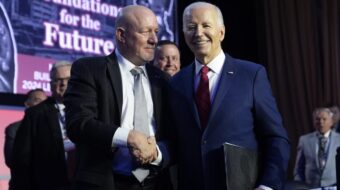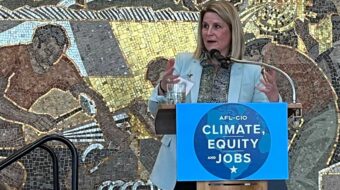
SAN DIEGO – Four big unions with tens of thousands of members who are public workers – AFSCME, the Service Employees and the nation’s two teachers unions – are trading information and tips on how to combat the impact of a looming anti-union ruling in the U.S. Supreme Court.
And even though the recent death of Justice Antonin Scalia may postpone the court’s decision on Friedrichs vs. California Teachers Association, the four will keep working jointly on public relations and legal strategy, adds Paul Booth, top assistant to AFSCME President Lee Saunders.
In a brief interview with Press Associates Union News Service during the AFL-CIO Executive Council meeting in San Diego, Booth said the four unions put together the demonstrations in front of the Court on Jan. 11, the day it heard oral arguments on the case.
The AFL-CIO also participated in that joint effort, he said. And AFSCME and the Alliance for Justice jointly produced a film about Friedrichs. Both in the film and at the court, unionists told personal stories about how unions help them, their students or their clients.
The case is a big topic at the AFL-CIO’s closed-door meeting. More than one-third of public workers, including teachers, Fire Fighters and state and local workers, are unionized, and their numbers are just under half of all union members nationwide.
Eliminating funds from those members – the stated objective of the right wing sponsors of the Friedrichs case – would drastically hurt the nation’s union movement and its ability to defend all workers, union and non-union alike. The right-wingers’ real objective is to completely de-fund, and thus kill, the nation’s unions.
The Friedrichs case, pushed by nine dissident California teachers funded and represented by the anti-worker anti-union National Right to Work Committee’s legal arm, challenges the right of any union representing public workers to collect either dues or “agency fees” – lesser amounts from represented workers who don’t want to be union members.
The RTW crew and the nine claim that collecting any money, even for basic things such as contract negotiations and grievance handling, violates their 1st Amendment free speech rights because it forces dissident workers to subsidize “political” speech they disagree with.
Unions respond that the non-members, called “agency fee payers,” should at least pay for basic services they get. Letting them get services without paying for them – the stated, but not ultimate, aim of the business-funded RTW Committee – would make millions of workers “free riders.”
Booth said the four unions talk about sharing work in “re-organizing” members to prevent the defection of masses of potential “free riders,” but that each is working on its own internal organizing plan. They’re not drafting a joint organizing plan to present to all unions, in both the AFL-CIO and Change To Win, that have public worker members.
“But there’s a lots of candor and a lot of mutual trust. There’s a widespread recognition that we’re all in this together,” he added.
On Jan. 11, the justices appeared to be leaning, 5-4 on partisan party lines, to vote for Friedrichs and the RTW committee, which would have overturned an almost 40-year-old precedent saying unions could charge “agency fee payers” for the basic services.
But Scalia was one of the five. His death leaves the status of the case up in the air. The remaining eight justices could tie 4-4, thus affirming the lower court’s rulings for the Teachers Association and other unions, which, with California, argued against Friedrichs. Or the justices could vote to hear the case all over again when a new ninth justice is seated.
Photo: Jan.11 NEA Members at the US Supreme Court for oral arguments in Friedrichs case. Image by Patrick G. Ryan. NEA Public Relations.

MOST POPULAR TODAY

Ohio: Franklin County treasurer attends Netanyahu meeting, steps up Israel Bond purchases

After months of denial, U.S. admits to running Ukraine biolabs

“Trail of Tears Walk” commemorates Native Americans’ forced removal

‘Warning! This product supports genocide’: Michigan group aims to educate consumers

Hold the communism, please: SFMOMA’s Diego Rivera exhibit downplays artist’s radical politics






Comments